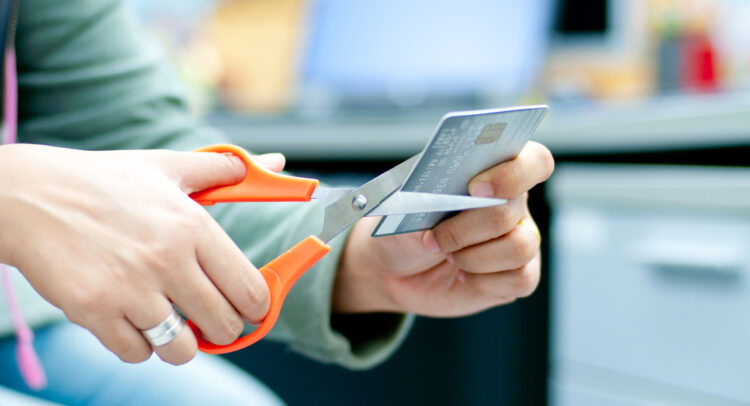We are living in a “material world,” as the iconic Madonna once said, and there is no shortage of ways to spend money. The ease of credit card usage does not even require us to have the money in our accounts; we can buy on credit and spend ourselves into debt. So, should you consider just cutting up your credit cards and only using cash to conduct your purchases?
Like every personal finance-related query, the answer depends on your individual circumstances. There are certainly benefits from using a credit card, though there are also scenarios where it could definitely make sense for you to bid them adieu.
Should You Stop Buying on Credit?
With the click of a button, we can purchase goods and services from anywhere on the planet. When we are out and about, using a credit card saves us the hassle of carrying a large amount of cash to conduct our transactions.
Beyond the physical convenience, using a credit card can allow you to earn awards points and other discounts that are offered by specific companies and retailers. These awards can add up over time, allowing you to save money on certain purchases.
Buying on credit also allows us to make purchases for items that we do not have the ability to afford. Assuming you pay your balance on time every month, you will not be charged any interest. However, if you keep a balance, you will be charged extremely high interest rates on the unpaid funds. Unless you are carefully managing your finances and paying your credit card balance every month, you could find yourself under mountains of debt.
What Is the Danger of Buying on Credit?
The biggest danger of buying on credit is that you will be tempted into making purchases that you cannot afford. Parting with money electronically is much easier than handing over cash, which can lead to scenarios in which you spend beyond your budget. The Envelope Method of budgeting, whereby every transaction is conducted in cash, was designed to address this imbalance.
Credit card debt is a particularly toxic beast; easy to fall into, but tough to climb out of. Because it usually compounds daily, these high-interest loans can quickly grow and spiral out of control.
The statistics tell a scary story. According to a recent report from the NY Federal Reserve, credit card debt in the United States increased by $50 billion during the last quarter of 2023 and currently stands at roughly $1.13 trillion.
The allure of consumer culture is often hard to resist, especially when it is so simple to purchase now and pay later. This can be quite problematic for those who lack the ability to stop themselves from spending more than they can afford.
How Can We Avoid Falling Into the Debt Trap?
Like all of your finance decisions, making sure that you are creating realistic budgets can help ensure that you are living within your means.
Regardless of how you spend money, you should make sure that the items you buy match your income. There is nothing wrong with taking a loan to purchase a house, car, or education, but make sure that you have the means and the commitment to pay back this obligation.
There are numerous types of budgetary frameworks that can help you to behave in a fiscally responsible manner. Though they vary in the amount of effort and monitoring required, every approach can help you plan out your spending and savings choices to ensure that your earnings are on par with your obligations.
There is no real secret to avoiding unmanageable debt other than making sure that your spending is consistent with your earned income.
Should You Say Goodbye to Your Credit Card?
There are plenty of good reasons to use a credit card, such as convenience, rewards points, and discounts, as well as the ability to make transactions all over the globe without the use of cash.
For these reasons, saying goodbye to your credit card is not an easy decision. There is another wrinkle as well: your credit score is calculated in part based on the length of time that your accounts have been opened. Closing one, especially an account that has been open for a while, can negatively impact your score.
If you are having difficulty reining in your spending, putting your credit card aside might make sense. That being said, closing your credit card account could be a bit drastic.
There are other less intense options available to remove temptation. First and foremost, you can take your credit card out of your wallet and leave it at home. In that vein, you could also remove your credit card information from your web browser or online sites, adding another step between you and a transaction purchased via credit.
Limiting your spending to items that you truly desire is never a bad idea. Creating another layer of oversight can help you cut down on these impulse buys.
Conclusion: Living Within Your Means
The ease of purchasing on credit can lead many into the trap of overspending. Credit cards allow us to buy items that we do not have the means to pay for, pushing us into debt.
The best way to manage your finances is to make sure that you have the ability to cover all of your purchases. If getting rid of your credit card can help you towards this goal, it could be a good move for you to make.
Learn money management, and use data-driven stock insights with TipRanks.









